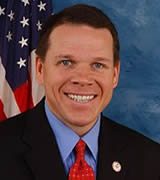|
The National Business Aviation Association has welcomed the introduction in the U.S. Senate and U.S. House of Representatives of new Pilot's Bill of Rights legislation, which includes
language proposed by NBAA to ensure that pilots and other certificate holders facing enforcement action by the FAA have timely access to information necessary to assist them in
formulating a proper defense.
U.S. Sens. James Inhofe (R-OK) and Joe Manchin (D-WV) introduced the Senate version of the bill, S.571, which builds upon the landmark Pilot's Bill of Rights (PBOR), signed into law in
August 2012. U.S. Reps. Sam Graves (R-6-MO) and Collin Peterson (D-7-MN) introduced a companion House measure, H.R. 1062.
“NBAA applauds these four leaders, and the other general aviation champions in Congress who have joined them, for continuing their call for key revisions to policies affecting general
aviation pilots across the United States,” said NBAA President and CEO Ed
Bolen. Bolen joined other aviation leaders in sending a letter to the four lawmakers to underscore their
support for the legislation.
|
“As a pilot, I know how important the original Pilot’s Bill of Rights, as signed into law in 2012, has been in establishing needed protections for pilots when dealing with FAA enforcement
proceedings,” said Rep.
Sam Graves. “This new bill improves upon those protections and expands the rights afforded to pilots and other certificate holders,” he continued. “I fully expect this bill
to receive the same strong, bipartisan support in Congress and across the general aviation community.”
"Pilot's Bill of Rights being signed into law in 2012 was a major victory for the aviation community, but I promised we would not stop there," said
Sen. James Inhofe. "Today, I am taking the next
step in keeping that promise by introducing the Pilot's Bill of Rights 2, which expands upon necessary reforms and continues to cut red tape hampering the general aviation community.
"Among many things, the legislation most importantly expands the FAA's existing third class medical exemption for light sport aircraft to cover most recreational airmen. This will protect
the rights of thousands of qualified airmen who would otherwise be grounded due to excessive medical regulation technicalities; this reform is of great need. It is an honor to have the
strong bipartisan support of my colleagues in Congress and of those in the general aviation community, and I am committed to shepherding this legislation through the 114th Congress.”
|
 |
|
Rep. Sam Graves |
 |
| Sen.
James Inhofe |
Last year, members of the NBAA Regulatory Issues Advisory Group joined Dick Doubrava, the Association’s vice president for government affairs, and Brian Koester, NBAA’s project
manager for operations, in meeting with Inhofe’s office regarding the addition of language that will ensure defendants have an opportunity to prepare a proper defense. The resulting
provision, specified in PBOR2, would require the FAA to hand over the enforcement report when serving emergency orders, and upon request in all other cases.
Although the timely release of such documentation was a key requirement in the original PBOR legislation, multiple reports from the pilot community indicate the agency has not
consistently released this documentation in sufficient time to enable defendants to mount a proper legal defense.
“This key provision ensures that pilots and other certificate holders facing FAA enforcement action are granted their due process under law,” Bolen added, “and is keeping with the spirit
and intent of the initial Pilots Bill of Rights measure in assuring that the nation’s pilot community is treated fairly during enforcement action proceedings. We are particularly pleased that
our concerns in this area are reflected in this new legislation, and we look forward to doing what we can to help move these important bills into law.”
Additional provisions outline specific actions the FAA may not take, should the agency fail to provide timely notifications to individuals facing enforcement action at the start of the
investigation. The House and Senate pilots’ rights bills would also prohibit the agency from moving forward with any enforcement action should the FAA fail to provide such notifications.
Also of note, PBOR2 would compel the FAA to take action on oft-delayed industry calls for reform to the third-class medical requirement for general aviation (GA) pilots, by expanding
upon a current medical exemption under the sport pilot category to cover certain noncommercial operations in GA aircraft with a maximum takeoff weight up to 6,000 lbs. NBAA has
supported industry calls for this reformed certification process.
The PBOR2 legislation also calls for expedited action to reform the Notice to Airmen
(NOTAM) process, and the extension of civil liability protections afforded to government employees to
aviation medical examiners and other FAA representatives in the private sector.
Congressional Bill provides third-class medical exemptions to pilots
The NBAA welcomed the introduction of congressional legislation to allow private pilots, in certain instances, to use a driver’s license in lieu of an
FAA medical certificate. The legislation -the General Aviation Pilot Protection Act (GAPPA) - was proposed in both the House and Senate on February 25th.
Under GAPPA, pilots who make noncommercial VFR flights in aircraft weighing up to 6,000 pounds with no more than six seats would be exempt from the third-class medical certification
requirement. Pilots would be limited to carrying a maximum of five passengers, flying at altitudes below 14,000 feet mean sea level (MSL), and at a speed no faster than 250 knots.
“We are encouraged by the bipartisan support demonstrated in both the House and Senate for practical efforts to exempt certain pilots from third-class medical certification requirements,”
NBAA President and CEO Ed Bolen said. “If an exemption to some medical certification requirements is allowed, the FAA’s scarce resources could be allocated to higher-risk oversight
activities, even as a focus on safe flying would remain in place. We encourage Congress to provide early consideration of this important legislation.”
|